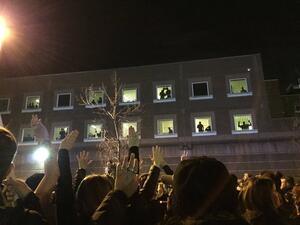In the Mississippi River
In 1964, three civil rights activists disappeared at the start of Mississippi’s Freedom Summer. Assuming that James Chaney (who was black), Andrew Goodman, and Mickey Schwerner (who were both white) had almost certainly been killed for investigating a racist church bombing, the rivers in Mississippi were dredged to look for their bodies. What they found instead is described in the song “In the Mississippi River” written by Matthew Jones and sung here by the Freedom Singers: Dozens of black Americans who had been murdered, their hands and feet tied, and sunk in the river. It was understood that no one outside of their friends and family members would ever notice they were gone.
Well you can count them one by one.
It could be your son.
Count them two by two.
To could be me or you.
As my Facebook newsfeed fills with righteous anger and calls to action after two grand juries have failed to indict the killers of Michael Brown and Eric Garner, I am haunted by the melody and the words of this song. Standing outside the South Bay Corrections Center at the Boston #BlackLivesMatter march last week, silhouettes of prisoners peering at the crowd through barred windows, this is the song I heard in my head. And as it played, I began to feel sick because fifty years later, almost exactly, we have found ourselves in the same world where some lives matter and other lives don’t.
And you can count them eight by eight
And they are gone in because of hate.
And you can count them nine by nine
In Mississippi this ain’t no crime.
A half a century ago, the Jewish community was not content with this world. In the shadow of the Holocaust, the memory of being considered subhuman still fresh, Jews refused to stand by as racist systems crushed black neighbors under the thumb of oppression. Jewish college students, rabbis, and women's coalitions joined the black-led movement for civil rights as passionate, effective allies. Today, while many Jews are taking to the streets, others are wondering what role they can or should have in a movement for racial justice. All of us are grappling with the privileges and oppressions that have shaped our identities as Jews. Time and again I have heard hesitation from people in the Jewish community about whether or not this is a fight we should be a part of. My answer to these voices is this: remember the Mississippi River.
In fifty years, we will look back on this moment. What will we see? How will we answer our children and grandchildren who ask about what we did to build a better future for them? Our predecessors have shown us that there are many ways to respond to the call for justice that is now resoundingly clear. They have also told us, in words as well as deeds, that we must stand and choose which side we will be on.
And you can count them ten by ten
And we wonder when the right will win.
Five ways to join the struggle for racial justice:
- If you are white, educate yourself about appropriate and responsible ways to take action and parse your own privilege. Check out the organization Showing Up For Racial Justice, which is posting articles and holding national training calls for white allies.
- If you are Jewish, recognize racial diversity in the Jewish community—not every American Jew has white skin or comes from an Eastern European immigrant family. Michael Twitty and Carolivia Herron have shared extremely personal and powerful reflections about their experiences as Jews of color. Reach out to people in your community and talk with one another. Also, take some time to learn about and grapple with the history of the American Jewish community. After this quick article, you may want to read Karen Brodkin’s How Jews Became White Folks.
- Strive to understand the racist policies and systems that have created the current national crisis around mass incarceration and police brutality. This article by Ta-Nehisi Coates and Michelle Alexander’s The New Jim Crow are easy to understand and fairly comprehensive.
- No matter who you are, allow black voices to come to the fore. Follow black folks who are leading the movements on the ground in Ferguson, New York, and in your own community, even when it is hard to concede your own knowledge or experience.
- Allow yourself to be uncomfortable. Be critical of what you hear, diversify your news sources, and be curious about others’ experiences. Stand and be counted—movements are made of individuals.







Wonderful article! And thank you especially for #5: "Allow yourself to be uncomfortable." The discomfort is an essential step towards redemption.
Thanks so much Etta King and JWA. This is perfect class material for my Hebrew High School! I will use it on Wednesday night.